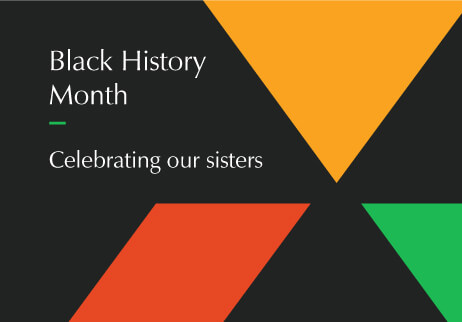Article
UK Black History Month: Celebrating our sisters
26 October 2023 | 3 minute read
My name is Josefina and I’m a second-year trainee at Withers LLP (‘Withers’), working out of the London office.
In the forgotten southern hinterlands of Madrid, far from the tourists and tapas of the centro, I reclined and dissolved back into our squishy sofa and switched on the TV for my daily dose of pre-homework entertainment.

9 years old, I was home from school and salivating at the prospect of a special treat for dinner. The air in the apartment was thick with decadent wafts of bubbling hot peanut stew from the kitchen, expertly attended to by my wonderful grandma through much of the afternoon, the family steward of culinary heritage dislocated thousands of miles from her village.
As much as I loved this part of my daily routine, watching TV could be a confusing and isolating experience. As one cartoon finished and another show started up, the absence of a single Black person on screen was conspicuous. Even at this tender age, I would ask myself why I didn’t see anybody on screen who looked like me.
Fast forward twenty years, and I had a similar experience when I first explored trainee schemes at law firms here in my adopted home of London. As I perused and pondered my options, I would scroll down the list of esteemed lawyers at a given firm and once again see few, if any, Black faces gazing back at me.
Even as a late career-changer, with nearly a decade’s life and work experience after graduating from my undergraduate studies, this experience still shook me. It made me doubt if these spaces were really meant for, or open to, “someone like me.”
We have to be honest: the legal industry, just like the societies around us, still has a long way to go on that front. If firms don’t get applications from many Black candidates, it’s not due to a lack of Black talent. It’s because we have to do more to make Black communities feel their identities and cultures will be welcome in historically White spaces, and that they can bring their whole self to work without stifling their Blackness to conform.
And as we contemplate the past through Black History Month, and simultaneously reflect on the importance of representation and visibility for the present, I wanted to harness this platform to shine a light on Black talent. Specifically, to highlight some of the inspirational and successful Black women I admire, both from near and afar, who are blazing trails.
I celebrate ‘our sisters’: Ade Hassan, MBE; Izzy Obeng, and Noëlla Coursaris Musunka.
Ade Hassan
Ade was frustrated by the lack of tights that matched her skin-tone - and decided to do something about it. Nubian Skin was born, a luxury brand dedicated to creating underwear and tights for ‘melanin-blessed’ women.
I interviewed Ade back in 2020 and I know firsthand that her business has had a game-changing impact for thousands of people who feel seen and celebrated by their products.
Izzy Obeng
Foundervine is one of the most dynamic launchpads for start-ups in London. Izzy Obeng, its founder, set out on a mission to help under-estimated founders to build start-ups from scratch.
She’s had phenomenal impact in helping Black entrepreneurs with incredible ideas - but which are often neglected by the wider start-up ecosystem - to find success. There’s a generation of Black-owned businesses in London which Izzy has helped build.
Noëlla Coursaris Musunka
Noëlla is a force of nature - an international model, champion of girls’ right to education, and the founder of Malaika.
Malika is incredible. It’s a girls’ school in the Democratic Republic of Congo, but so much more than that: it’s a blueprint for how to catalyse development in low-income countries through healthcare, access to water, and quality education. Noëlla has transformed a community and the lives of its people - I admire her immensely.
I came into the law to help people find success - whatever their background, and whatever that means to them. Ade, Izzie and Noëlla are all trailblazers, who have forged a path to success in different spaces, from business to beauty and beyond.
We owe it to the next generation of young Black talent to show them that, though it will not always be easy, they can break new ground because others have before them.